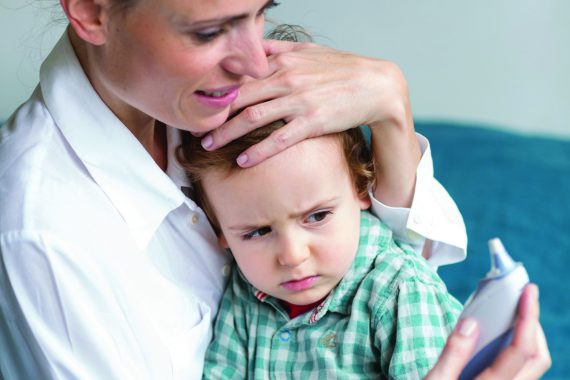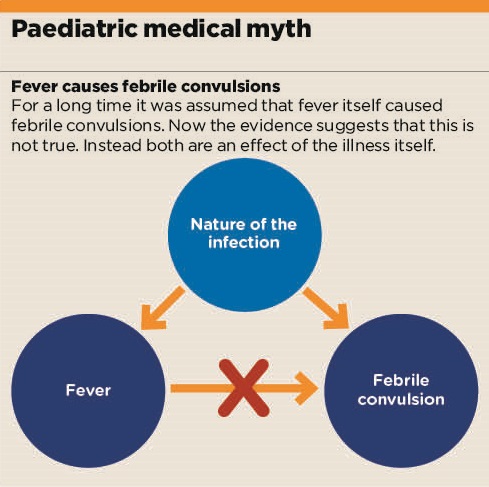Does childhood fever cause febrile convulsions?

What is the myth and where did it come from?
It was always assumed that childhood fever caused febrile convulsions. Most of the time, when one event consistently follows another, our assumption about cause and effect is correct. However, sometimes that assumption is wrong, because usually there is a factor that we haven’t seen or considered. For example, it is not the safari that gives you malaria, it is the mosquito bite.
What is the reality?
The available evidence shows that treating fever in children does not prevent febrile convulsions.1 This leads us to the inevitable conclusion that there must be a mosquito in the mix somewhere. There has to be a common cause of both the fever and the fit that we can’t see. That common cause is almost certainly the infection itself. The infection provokes a fever and somehow the infection also provokes a seizure. We could get technical about physiological mechanisms for this, but it’s best to think of the fever and the fit both being triggered by the nature of the infection.
The evidence tells us that while we can intervene to control a temperature, febrile convulsions will continue to occur. Presumably the infection’s particular characteristics do something to the brain that paracetamol won’t block.
Thankfully, the majority of febrile convulsions are brief, self-limiting and have no long-term implications.

How does this change my practice?
This information may well mean we don’t have to worry so much about treating fever for its own sake.
In children, being febrile is not in itself harmful. But there is certainly merit in treating these symptoms if the child feels unwell or is in pain (as they usually are with ear or throat infections). Children often need these symptoms to be treated so that they can feel well enough to do important things like drink.
So, in short, children who are febrile will often benefit from paracetamol or ibuprofen, but mostly for the analgesic effect. These medicines do also reduce fever but there is no specific reason to give them if a child has a fever without also having pain or malaise.
Removing the guilt
This change in our understanding of febrile fits is particularly important news for the parents of children who have had a febrile convulsion. There is often a huge amount of guilt associated with the implied or explicitly expressed cause, an implication that failure to control the fever is the reason the child had the seizure.
We need to make sure that parents know that a seizure in this situation was not their fault. They need to know that the seizure happened because the child had an infection, not because they had a fever.
This also means that they can treat their child symptomatically, rather than being on alert for febrile convulsions. Parents whose children have had a febrile fit often check their child’s temperature obsessively.
So spread the good news – fever is not dangerous to children. If anyone disagrees with you, an interesting approach is to ask them what the number is for a safe temperature – the temperature below which there are no dangers from the fever. They won’t be able to give you a valid number because there isn’t one. In fact, you could ask them for a number that defines a fever. Interestingly, there is no widely accepted temperature that defines being febrile. But that doesn’t matter too much, since fever is a sign of illness, and it is the illness that causes the problems, not the fever itself.
Dr Edward Snelson is a consultant paediatrician specialising in paediatric emergency medicine at the Sheffield Children’s Hospital.
He is the author of The Essential Handbook of Common Paediatric Cases and of gppaedstips.blogspot.co.uk – a site for GPs to keep up to date with paediatrics in primary care. Before becoming a paediatrician, he was a GP for more than five years, and now uses that experience to fuel his educational work in primary care. Tweet him @sailordoctor
Reference
- Sahib El-Radhi A, Barry W. Do anti-pyretics prevent febrile convulsions? Arch Dis Child 2003;88:641-2
Got a medical myth you want us to explore? Email [email protected] with your ideas
Visit Pulse Reference for details on 140 symptoms, including easily searchable symptoms and categories, offering you a free platform to check symptoms and receive potential diagnoses during consultations.









